Editor’s note: Political leadership to achieve Universal Health Coverage (UHC) has never been more crucial in Nigeria than it is now. In line with the theme for UHC Day 2023- Health for All: Time for Action- policymakers need to take immediate action to ensure health for Nigerians without financial difficulties. This Thought Leadership article highlights how private sector financing can support the goal of UHC in Nigeria based on discussions from the panel session- “Private Sector Financing for Health Systems Strengthening to Achieve Universal Health Coverage (UHC)- at the 9th Future of Health Conference.
Health for All: Time for Action
For years, the federal government of Nigeria has consistently allocated less than 15% as a share of gross domestic product (GDP) to the health sector, with only two states — Kaduna and Sokoto states, meeting the African Union health allocation target. In 2023, only 5.75% was allocated to the health sector which is not up to half of what was pledged by African Union members in the 2001 Abuja Declaration.
The theme for this year’s UHC day — Health for All: Time for Action– emphasises the need for leaders to enact policies that guarantee equitable access to essential health services without financial hardship. To achieve this, the theme urges collaboration across sectors — governments, NGOs, the private sector, and civil society — to make universal health coverage a reality by 2030.
Financing mechanisms from the private sector can significantly contribute to this UHC reality. This is also in line with one of the commitments outlined in the UHC2030 Private Sector Constituency Statement which states that the private sector can support governments to articulate the business case for investing in health and UHC. However, this unified commitment is dependent on effective collaboration between the public and private sectors, recognising their respective roles in providing equitable and comprehensive health coverage.
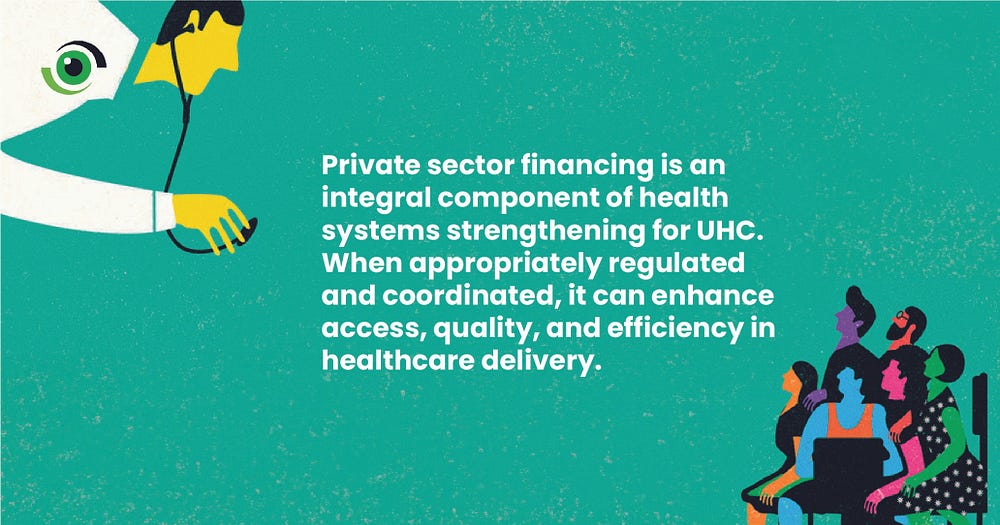
Speaking on the panel, at the 2023 Future of Health conference, experts discussed the critical role that the private sector can play in financing the health system and in achieving universal health coverage in Nigeria.
Exploring innovative financing mechanisms
Several innovative approaches to financing health have been designed and deployed in Nigeria, as part of efforts to deliver quality and affordable healthcare for all Nigerians. Dr. Jadesola Idowu, Chief Operating Officer AXA MANSARD Health mentioned premium financing as an innovative financing solution used by AXA MANSARD Health to increase access to healthcare for a larger population. This includes collaboration with Fintech companies and banks as well as telecommunication companies where people can pay with their data for microinsurance products. “Some Fintech also help to provide some form of microinsurance for when people cannot even pay. We also have a partnership with Airtel where people can pay with their data for micro insurance products. So, they can’t pay the bulk sum for the corporate plan, but they can pay N450 per month, or they can pay N1000 for the AXA Pass scratch card and have access to healthcare for one month accumulating to just N12,000 for the whole year”.
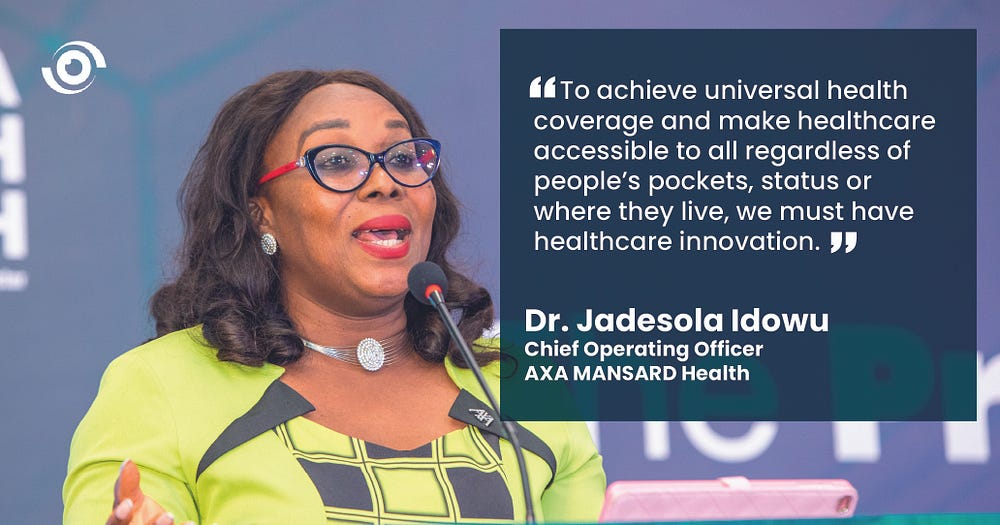
The NHIA website states that “Universal Health Coverage is our Goal”, however, since state health insurance was launched under the Nigeria Health Insurance Scheme (NHIS) in 2005, only about 5% of Nigerians, mainly in the formal public sector have access to health insurance. In addition, HMOs, provide health insurance for employees in the organised private sector. According to Dr. Tinuola Akinbolagbe, Chief Executive Officer, Private Sector Health Alliance of Nigeria (PSHAN) there must also be a business space for other multi-private sector organisations, not just the private health sector, to invest in health. “For those of you who watch Netflix as much as I do, some of the movies that have been released recently have been financed by Fintech. So, we are having sub-sector collaborations where the finance sector is investing in Nollywood. So why can’t we have other members of the multi private sector invest in healthcare?” She asked.
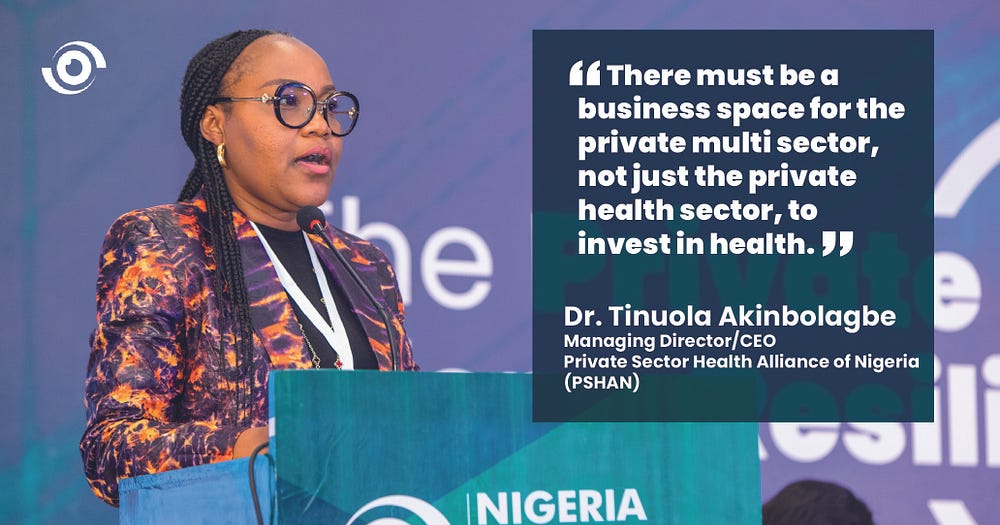
Dr Akinbolagbe further iterated that such collaborations should begin with educating potential multisectoral partners on the healthcare system in Nigeria. Her question also spurred conversations around political leadership in ensuring that the regulatory environment is in place for private-sector partnerships to increase access to healthcare.
Getting governance right
This UHC Day calls upon political leaders to develop policies that enable access to health services for ALL. Developing policies could also mean creating favourable policies that support private-sector integration. On the panel, Dr Jide Idris, Former Honourable Commissioner of Health, Lagos State shared lessons learned during his tenure as commissioner and noted the crucial role the government had to play in creating an enabling environment for the private sector to thrive in terms of legislation and regulations.
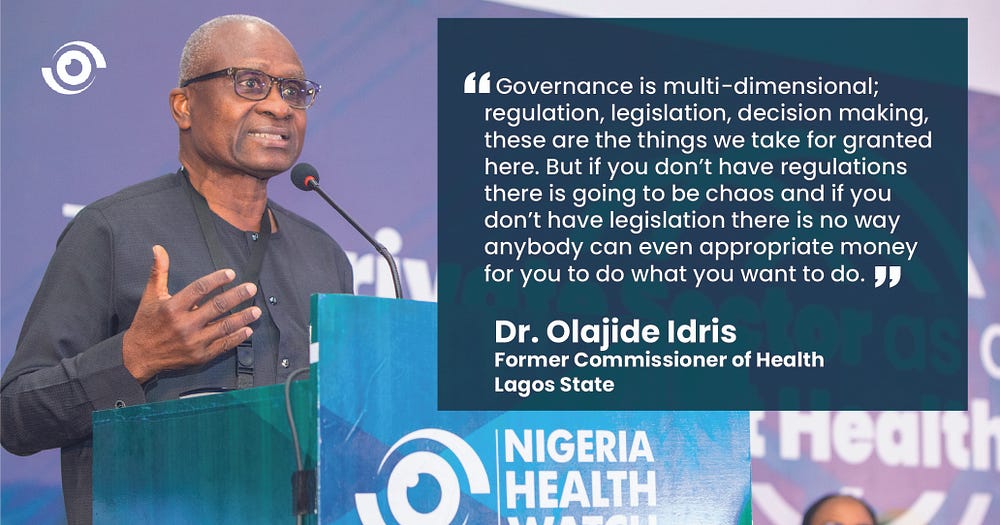
“We have the laws, but the sanctity of contracts is lost, you can sign a contract today and you go back tomorrow, and things have changed, that does not encourage the private sector”. -Dr Jide Idris.
Creating an enabling environment would require changing the mindset of the government towards private-sector partnerships according to Dr Idris. “The lesson we learnt was that; once the culture of the civil service is wrong, in some respects for the private sector, you need to change it….We were lucky in Lagos in the sense that the governor at the time, appreciated the role of the private sector and listened to us”
Sharing additional lessons, Dr Idris highlighted the various financing and resource mobilisation strategies the Lagos State Ministry of Health explored in partnering with the private sector, “in service delivery, we tried something like joint venture participation on a pharmacy division, And what we realised was that there was a drug revolving funds that we had, which was not revolving. So, we said to bring in the private sector, give them space in the teaching hospital, let them bring all the drugs they have, and they should not go beyond particular charges. Within a month, we saw the progress the private sector could do with the amount of money that came into that”.
This is a good example of how the government can take political leadership towards the achievement of UHC.
Advancing diagnostics and medical manufacturing
Dr Tolulope Adewale, Managing Director, Nigerian Sovereign Investment Authority, Advanced Medical Services Limited, spoke on the future of healthcare in Nigeria and how the Nigerian Sovereign Investment Authority (NSIA) is investing in that future. The NSIA manages the Nigeria sovereign wealth fund and in his presentation, Dr Adewale highlighted private sector investments in health targeted at breaching the gap between product delivery and service provision. He stated that “There was only one epileptic linear accelerator in Nigeria prior to making this investment — it was in the National Hospital Abuja, … between 2019 and today, from one epileptic linear accelerator to about a total of 14 linear accelerators in Nigeria today. For us, that is the real success. Making the private sector see that this is doable and now the private sector has keyed into it, and that is growing”.
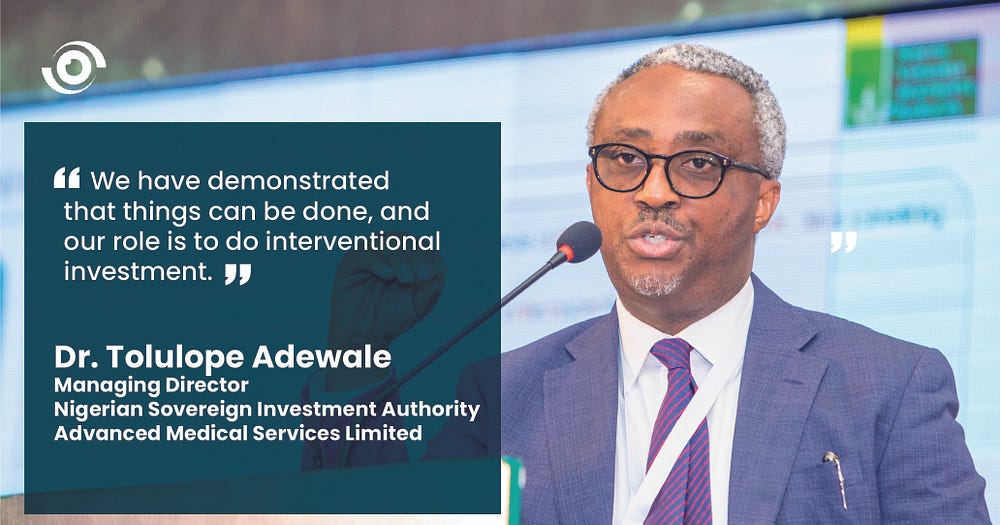
There is a critical need to scale up local manufacturing and diagnostics in Nigeria, if the goal of UHC is to be attained. This is an area where private sector support can greatly benefit. One of the three core areas NSIA operates in is cancer diagnostics. According to Dr Adewale, “we set up diagnostics centres in places regarded as the bottom of the pyramid and make sure that they can access care and that is all we are trying to do. We achieve that by going to places it is not profitable or commercially viable for the private sector”.
His remarks emphasise the importance of such initiatives in increasing access to healthcare, strengthening the country’s economic benefits, and ensuring that well-being is not a privilege for a few but a right for all.
Making health everybody’s business
In Nigeria, sometimes, the journey to UHC seems almost too difficult an expedition. Yet, it is clear that a financial gap exists between the resources needed for UHC and what is currently being allocated for health in Nigeria.
Recognising that the private sector has an important role to play in supporting UHC can go a long way to close that gap and ensure “Health for All”, however, the “Time for Action” is now.


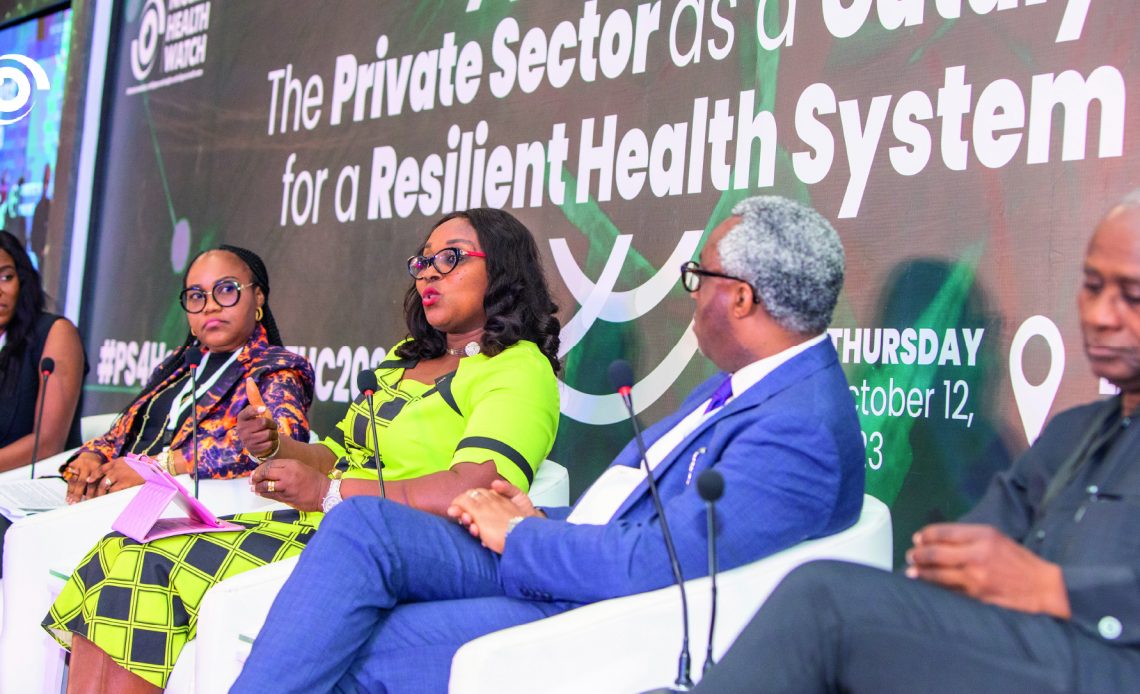
Great!
Amazing!